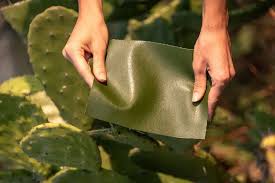Cactus Leather vs. Traditional Leather: What’s the Difference?
As sustainability becomes a priority in fashion, innovative alternatives like cactus leather are gaining popularity. But how does it compare to traditional leather? Below, we break down the key differences between these two materials in terms of sustainability, durability, and ethical impact.
1. Environmental Impact
Cactus Leather:
-
Made from the prickly pear cactus, which requires minimal water to grow.
-
Free from toxic chemicals, heavy metals, and pesticides used in conventional tanning processes.
-
Reduces carbon emissions compared to livestock farming.
-
Fully biodegradable and produced using a low-energy process.
Traditional Leather:
-
Comes from animal hides, contributing to deforestation and greenhouse gas emissions from livestock.
-
Requires extensive water usage for raising animals and processing hides.
-
Often treated with harmful chemicals like chromium in the tanning process, which can pollute water sources.
-
Non-biodegradable when chemically treated.
2. Ethical Considerations
Cactus Leather:
-
100% vegan and cruelty-free, ensuring no harm to animals.
-
Provides an ethical alternative to animal leather without sacrificing quality or style.
Traditional Leather:
-
Animal-derived, raising concerns about animal welfare in the leather industry.
-
Leather production often involves harsh working conditions for laborers exposed to toxic chemicals.
3. Durability & Performance
Cactus Leather:
-
Highly durable and resistant to wear and tear.
-
Soft, flexible, and breathable, offering a premium feel similar to animal leather.
-
Water-resistant and easy to maintain.
Traditional Leather:
-
Known for its durability and long lifespan, but requires frequent conditioning to prevent cracking.
-
Can be water-resistant but often needs chemical treatments to maintain its properties.
4. Aesthetic & Versatility
Cactus Leather:
-
Can mimic the look and texture of traditional leather.
-
Available in various finishes and colors without the need for toxic dyes.
Traditional Leather:
-
Valued for its natural patina that develops over time.
-
Limited in production methods that meet sustainability standards.
Why Boatman Style Chooses Cactus Leather
At Boatman Style, we believe in fashion without compromise—our cactus leather footwear and accessories combine sustainability, durability, and luxury. By choosing cactus leather, we reduce environmental impact while offering premium products that align with both ethical and eco-conscious values.
Conclusion: The Future of Sustainable Leather
While traditional leather has long been associated with quality and luxury, cactus leather provides a modern, eco-friendly alternative without harming animals or the planet. As more brands and consumers embrace sustainability, cactus leather is proving to be a game-changer in the fashion industry.

